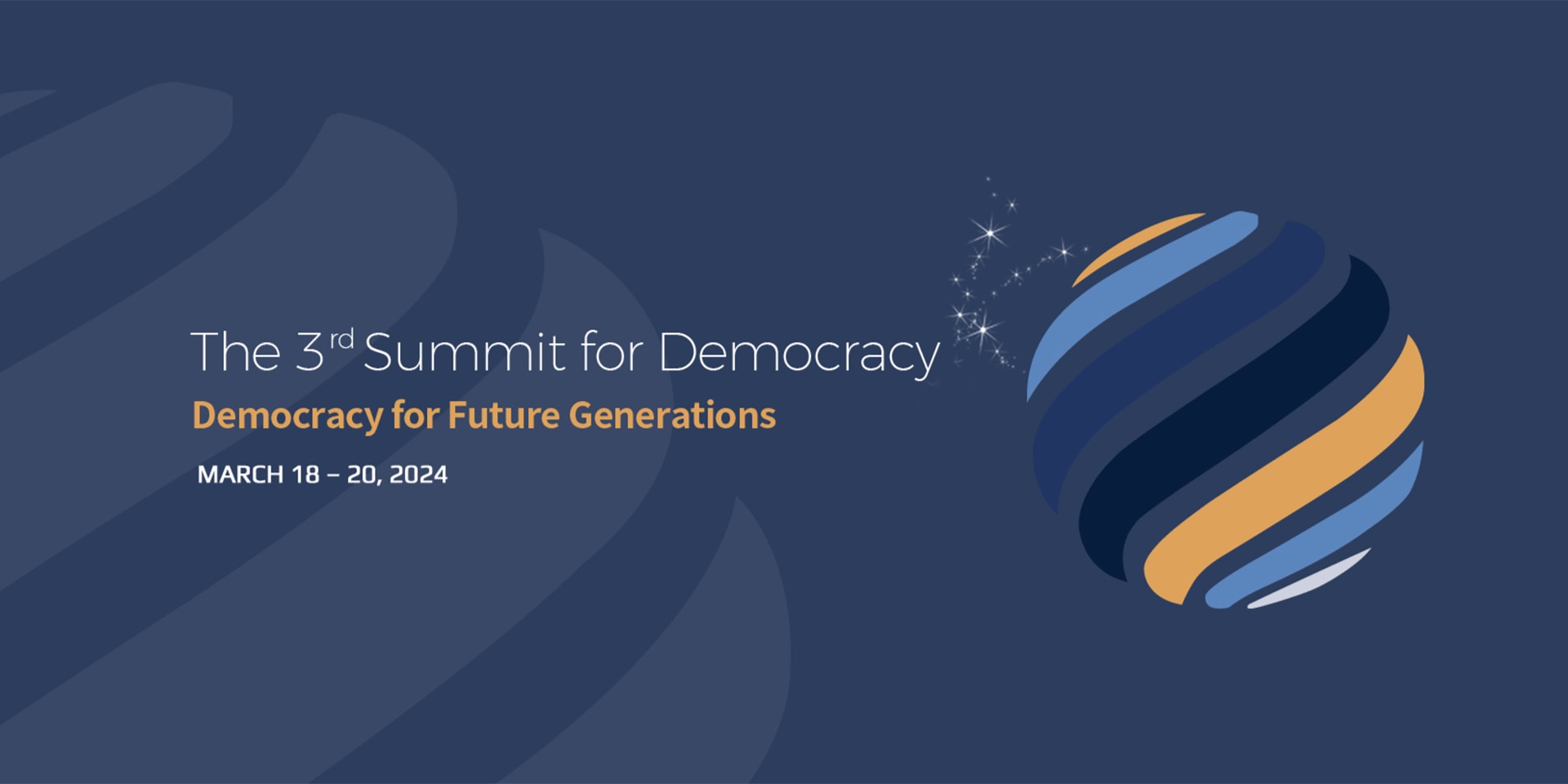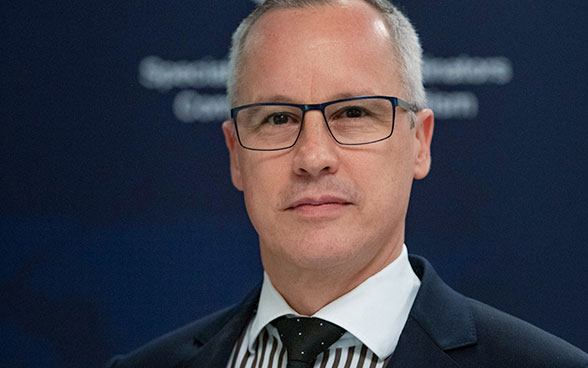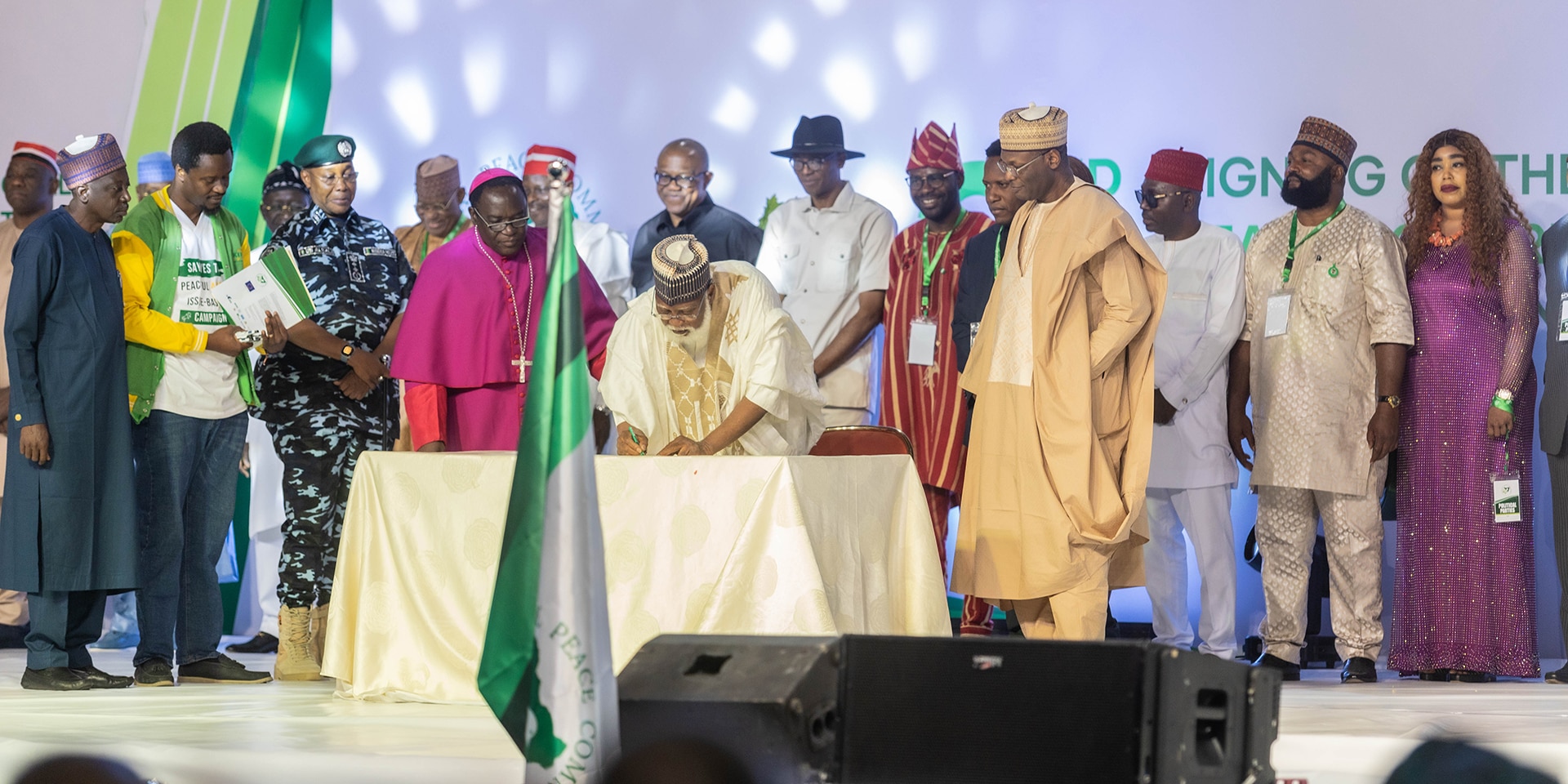"A democracy is never guaranteed forever"
Authoritarian tendencies and regimes are gaining ground in many places around the world. At the same time, democracies are coming under pressure both internally and externally. The Federal Council has therefore defined 'democracy and governance' as one of the thematic priorities of the Foreign Policy Strategy 2024–27. The Summit for Democracy is also examining how democratic systems can be reinforced. Young people have a particularly important part to play here, says Ambassador Simon Geissbühler, who is representing Switzerland at the Summit in Seoul.

'Democracy for Future Generations' is the theme of the 3rd Summit for Democracy in Seoul. © Summit for Democracy

Ambassador, the principal theme of the Summit for Democracy is 'Democracy for Future Generations'. Which issues do you think will particularly dominate discussions?
A democracy is never guaranteed forever. Democracies aren't just about peace and harmony. On the contrary, they necessarily also involve a diversity of ideas, contest between them, and dispute. It is crucial that young people play a part in this evolution and fortification of democracy.
Key issues here are the question of participation and the role of digital technologies in democracy, for example. Are there new ways of taking part in the political process that suit young people better? What might motivate young people to get involved and contribute to democracy? How can we make our societies and the current media and information ecosystem more resilient? The media literacy skills we need are changing rapidly and expanding all the time. How do we handle that? These are just some of the questions that we will be discussing in Seoul.
People seem to be talking more of a democratic 'recession'. What are the signs of this?
After the end of the Cold War and the subsequent wave of democratisation, especially in the former Eastern bloc, large numbers believed that democracy had won and was here to stay. Francis Fukuyama spoke of the 'end of history'. It seemed to many that democracy could be taken for granted, as guaranteed. There was a certain feeling of self-satisfaction. Why did we need to bother promoting democracy at all?
But then the tide slowly began to turn. Democracies came under pressure both internally and externally, and autocracies became increasingly aggressive. We saw the beginning of a recessive trend in democracy that has been ongoing for almost 20 years now. A clear majority of the world's population now lives under non-democratic regimes.
The Federal Council has responded to the growing pressure on democracy and democratic values and structures in the Foreign Policy Strategy for 2024 to 2027, defining 'democracy and governance' as one of the four thematic priorities. How can Switzerland make a difference here?
The democratic recession of the past 20 years or so cast a different light upon our constitutional mandate to promote democracy, as set out in Article 54. The Federal Council therefore concluded in the FPS 2024–27 that promoting democracy must now "be tackled systematically and coherently".
The first task was to establish what Switzerland actually does to promote democracy. And it already does a great deal, although it does not always call its efforts democracy promotion. There are good reasons for that. Now we are defining the delta. What can we do better and more effectively, differently and additionally, knowing that shrinking resources mean that we will not have any extra funding?
Have any specific focal points been defined so far?
I'll give you four examples of possible action areas. First, we can focus on promoting democratic resilience, in other words on supporting existing democracies that come under internal or external pressure. Let's take Ukraine, for instance. How can we help right now – at a time of stress – to sustain freedom of opinion, participation, and a vigorous civil society?
Second, while rays of democratic hope and success stories have become rare over the past two decades, they are still there. If they want us to and it is possible, we would like to partner with such states in consolidating their democracy.
Third, we will strengthen dialogue, relations and cooperation with other democracies, both within and outside Europe.
Fourth, we are considering whether we might occasionally extend Switzerland's good offices to democracy. We would like to provide platforms on which the relevant political actors can engage and coordinate with each other to share experience or launch activities. As you see, we have plenty of ideas. The task now is to give them substance.
And I would like to add one more thing: we can't just do a little something everywhere, even if there is great demand. We would be fragmenting ourselves. Instead we will take a strategic approach and set priorities. That is why we are currently writing the FDFA Guidelines for Democracy on behalf of the head of the Department. They are due to be published this summer.
What instruments can the federal government use here?
We can instigate networks, dialogues and political initiatives so that we can deploy the diplomatic toolbox more, and more systematically, for democracy-focused foreign policy. We can also work with other states and with partners from civil society or the private sector to achieve our strategic objectives as efficiently and coherently as possible.
With its system of direct democracy, Switzerland has a great deal of experience with civic participation in political decisions, and the inclusion of minorities. Is that a help in multilateral cooperation, or a hindrance when it comes to collaborating towards general minimum standards?
It is true that, in 2021, 80 per cent of respondents to a representative survey said that Switzerland's democratic tradition predestined it to promote democracy around the world. That is linked to the positive experience we have had with our own direct democracy, which is something that we can certainly be proud of. Democracy interweaves domestic and foreign policy. Of course, it isn't about peddling the Swiss model of democracy to other countries. However, that model is an inspiration to others, gives us a high degree of credibility and enables us, as partners, to speak about democracy in all its diversity with other states and to work with them.
There is no denying that the relationship between democracy and the majority principle on the one hand, and protection for minorities on the other, is somewhat charged. This is eased by a model of democracy that, while centring on the will of the majority, sets boundaries for that will in a constitution that grants individual rights and freedoms.
The Peace and Human Rights Division at the FDFA set up a new Democracy Section in January 2024. What do you want to achieve with this new structure?
As the saying goes, structure follows strategy. I have been working steadily on the issue of democracy since I became head of the division in the spring of 2020. I drew up an initial input paper for the State Secretariat that summer, and then took charge of the democracy summit process. In 2021 we held a number of online discussions with globally respected experts, and in 2022 we organised the first Giessbach retreat with colleagues of mine working on democracy and promoting democracy in other foreign ministries. The second Giessbach retreat took place in 2023, and we published an anthology entitled 'Democracy and Democracy Promotion in a Fractured World' (LIT Verlag). In each of 2022 and 2023 we held a panel discussion on the issue at the FDFA Ambassadors' Conference.
Democracy has now also been firmly incorporated into the Foreign Policy Strategy 2024–27 as one of its thematic priorities. With this in mind, it soon became clear to me that we needed a structure in the Peace and Human Rights division that would enable us to tackle the issue and meet the expectations of us. Our Democracy section has now been up and running since 1 January 2024 under the leadership of Ariadna Pop. I am proud that we have achieved that. It comes at just the right time. Now we can really get started.
What factors do you think are crucial to pull the world out of democratic 'recession' and restore democratic stability?
First of all we should put our own complacency to one side and stop doing democracy down. After all, empirical studies clearly demonstrate its efficiency and advantages. We need to place greater emphasis on this efficiency and these advantages, and communicate them better. We are envied around the world for our unique opportunities for participation and co-determination. Let's make better use of these again. As a French philosopher said not long ago, democracy could also be fun and a cause for celebration.
In that case, we should also stop being quite so naive. Democracy is also under pressure from outside, and we should be confident in countering these risks.

